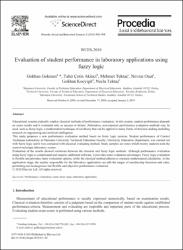| dc.contributor.author | Gökmen, Gökhan | |
| dc.contributor.author | Akıncı, Tahir Çetin | |
| dc.contributor.author | Tektaş, Mehmet | |
| dc.contributor.author | Onat, Nevzat | |
| dc.contributor.author | Koçyiğit, Gökhan | |
| dc.contributor.author | Tektaş, Necla | |
| dc.date.accessioned | 2021-12-12T17:01:54Z | |
| dc.date.available | 2021-12-12T17:01:54Z | |
| dc.date.issued | 2010 | |
| dc.identifier.issn | 1877-0428 | |
| dc.identifier.uri | https://doi.org/10.1016/j.sbspro.2010.03.124 | |
| dc.identifier.uri | https://hdl.handle.net/20.500.11857/3328 | |
| dc.description | 2nd World Conference on Educational Sciences (WCES-2010) -- FEB 04-08, 2010 -- Bahceschir Univ, Istanbul, TURKEY -- | en_US |
| dc.description.abstract | Educational systems typically employ classical methods of performance evaluation. In this system, student performance depends on exam results and is evaluated only as success or failure. Alternative, non-classical performance evaluation methods may be used, such as fuzzy logic, a mathematical technique of set-theory that can be applied to many forms of decision-making including research on engineering and artificial intelligence. This study proposes a new performance evaluation method based on fuzzy logic systems. Student performance of Control Technique Laboratory in Marmara University Technical Education Faculty, Electricity Education Department, was carried out with fuzzy logic and it was compared with classical evaluating method. Study samples are notes which twenty students took the control technique laboratory course. Evaluation of the results showed variations between the classical and fuzzy logic methods. Although performance evaluation using fuzzy logic is complicated and requires additional software, it provides some evaluation advantages. Fuzzy logic evaluation is flexible and provides many evaluation options, while the classical method adheres to constant mathematical calculation. At the application stage, the teacher responsible for the laboratory application can edit the ranges of membership functions and rules, permitting non-homogenous but flexible and objective performance evaluation. (C) 2010 Elsevier Ltd. All rights reserved. | en_US |
| dc.description.sponsorship | T.R Marmara University Scientific Research Project PresidencyMarmara University [FEN-E-050608-138] | en_US |
| dc.description.sponsorship | This study is supported by T.R Marmara University Scientific Research Project Presidency; under project no FEN-E-050608-138. | en_US |
| dc.language.iso | eng | en_US |
| dc.publisher | Elsevier Science Bv | en_US |
| dc.relation.ispartof | Innovation and Creativity In Education | en_US |
| dc.identifier.doi | 10.1016/j.sbspro.2010.03.124 | |
| dc.rights | info:eu-repo/semantics/openAccess | en_US |
| dc.subject | Performance | en_US |
| dc.subject | evaluation | en_US |
| dc.subject | exam | en_US |
| dc.subject | fuzzy logic | en_US |
| dc.subject | laboratory application | en_US |
| dc.title | Evaluation of student performance in laboratory applications using fuzzy logic | en_US |
| dc.type | proceedingsPaper | |
| dc.authorid | TEKTAS, MEHMET/0000-0002-8190-4532 | |
| dc.authorid | Tektas, Necla/0000-0002-8190-4532 | |
| dc.authorid | AKINCI, Tahir Cetin/0000-0002-4657-6617 | |
| dc.department | Fakülteler, Mühendislik Fakültesi, Elektrik-Elektronik Mühendisliği Bölümü | |
| dc.identifier.volume | 2 | en_US |
| dc.identifier.startpage | 902 | en_US |
| dc.identifier.issue | 2 | en_US |
| dc.identifier.endpage | 909 | en_US |
| dc.relation.publicationcategory | Konferans Öğesi - Uluslararası - Kurum Öğretim Elemanı | en_US |
| dc.identifier.wos | WOS:000282002800119 | en_US |
| dc.authorwosid | TEKTAS, MEHMET/M-2949-2017 | |
| dc.authorwosid | Tektas, Necla/AAA-2076-2020 | |
| dc.authorwosid | Tektas, Mehmet/L-5946-2019 | |
| dc.authorwosid | AKINCI, Tahir Cetin/AAB-3397-2021 | |
| dc.authorwosid | Gokmen, Gokhan/AAG-6655-2020 | |



















